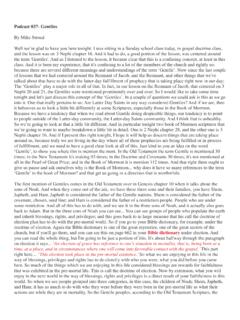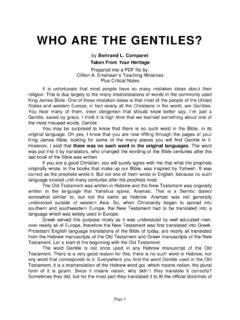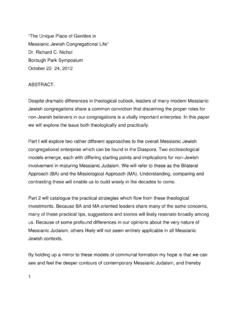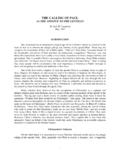Transcription of Who Are the Gentiles of the Book of Mormon
1 CHAPTER IVWho Are the & quot ; Gentiles & quot ; of theBook of MormonThe word & quot ;Gentile,& quot ; used in the collective sense, occurs five times in the book ofMormon, including the three times it appears on the title page. The plural form, & quot ; Gentiles ,& quot ;is found upwards of 141 times. We have inherited & quot ;Gentile& quot ; from the Latin gentilis,& quot ;belonging to the same tribe or family& quot ;; from gens & quot ;tribe,& quot ; & quot ;family.& quot ; Inasmuch as theNephites were descendants of the ancient Hebrews, it may be of interest to consider brieflythe significance of the term ''Gentile'' its Hebrew equivalent is goi (& quot ;nation,& quot ; & quot ;people'') inthe Old Testament. When the Lord made His great compact with Abraham, He promisedthe Father of the Faithful that through his seed the Gospel and the Priesthood should becarried through the world to bless all nations.
2 (See Abr. 2:8-11.) Thus Israel was destinedto become a nation and a people set apart a people & quot ;chosen& quot ; to bless the goyim or& quot ; Gentiles .& quot ;For thou art an holy people unto the Lord thy God: The Lord thy Godhath chosen thee to be a special people unto himself, above all people thatare upon the face of the earth. (Deut. 7:6)..But thou, Israel, art my servant, Jacob whom I have chosen, the seedof Abraham my friend. (Isa. 41:8)..O ye seed of Israel His servant, ye children of Jacob, His chosenones. (I Chron. 16:13)So we see that the Hebrews were supposed to be a unique and separate people,a righteous people, holding22 ANSWERS TO book OF Mormon QUESTIONS themselves aloof from degrading Gentile ideas and customs. They proselyted among theGentiles and, in the days of their righteousness, doubtless brought many into the fold who,by conversion, benefited religiously and became themselves Israelites.
3 Sometimes theword goi was used to mean people who did not believe in the God of Israel, and was evenused in a derogatory there any among the vanities of the Gentiles [goyim] that cancause rain? (Jer. 14:22)In general, we may say that the Old Testament, aside from references to theHebrews themselves, very often used goyim to designate those who were not of theHebrew people and religion they were Gentiles or , let us see how the book of Mormon uses the term & quot ;Gentile& quot ; or & quot ; Gentiles .& quot ; Itshould be remembered that all of the Nephites who originally came to this continent were,as far as we know, of the house of Israel. Consequently they had no need during thethousand years of their history to refer to any group of their own people as , there is not a single reference in the book of Mormon where even the Lamanitesor any other dissident peoples are alluded to by that term.
4 Of interest is the fact that mostof the references to the Gentiles in the Nephite record obviously allude to Gentiles (non-Israelites) of the latter days, to relatively modern times. Some few references suchas in 1 Nephi 13:3-4, seemingly allude to Gentiles of about the second century interest is the way & quot ;Gentile& quot ; is used on the title page of the book of first reference is this:Written to the Lamanites, who are a remnant of the house of Israel;and also to Jew and Gentile Here, Moroni clearly distinguishes between two branches of Israel the Lamanitesand Jews and the & quot ;Gentile,& quot ; obviously the non-Israelite. To those not of our faith'' Gentiles & quot ; OF THE book OF MORMON23it may be pointed out that Moroni would surely know that the & quot ;Jew& quot ; was also of Israel.
5 (See 1 Nephi 15:19-20.) The second reference to & quot ;Gentile& quot ; in the first paragraph readsas follows:Sealed by the hand of Moroni, and hid up unto the Lord, to come forthin due time by way of the Gentile This reference to & quot ;Gentile& quot ; is of unusual interest and needs some explanation. TheLatter-day Saints have always claimed to be of Israel (see D. & C. 103:16-17; 133: 32-34),and they are the ones who have brought forth the book of Mormon . Joseph Smith theprophet was assuredly of Israel, and he translated the Nephite record and originally sentit forth. So why does Moroni in the title page say it is & quot ;to come forth in due time by way ofthe Gentile?& quot ; How is & quot ;Gentile& quot ; to be construed here? As a matter of fact, even the Saviorused the word as Moroni did when speaking to the Nephites after His resurrection:Therefore, when these works and the works which shall be wroughtamong you hereafter shall come forth from the Gentiles , unto your seedwhich shall dwindle in unbelief because of iniquity; for thus it behooveth theFather that it should come forth from the Gentiles .
6 (3 Nephi 21:5-6)The answer to our question is probably this. Moroni, and of course the Savior, knewthat when the book of Mormon came forth in the latter days, it would come by way of thegreat Gentile nation spoken of hundreds of years before by Nephi the prophet:The Lord God will raise up a mighty nation [United States] among theGentiles, yea, even upon the face of this land; and by them shall our seedbe scattered. And after our seed is scattered the Lord God will proceed todo a marvelous work among the Gentiles , which shall be of great worth untoour seed. (1 Nephi 22:7-8)24 ANSWERS TO book OF Mormon QUESTIONSThe Latter-day Saints who bring forth the book of Mormon , thus assisting the Lordto do his marvelous work & quot ;among the Gentiles ,& quot ; are & quot ; Gentiles & quot ; in the political sense.
7 Weare citizens of this great Gentile republic, the United States. So Moroni, the Savior, andsome other writers speak of us as & quot ; Gentiles & quot ; in the political sense, and this fact must bekept in mind by readers of the Nephite record. (See, , 1 Nephi 13:39; 15:13; :15; 3 Nephi 16:4, 6; 21:5.)The third reference to & quot ;Gentile& quot ; on the title page occurs in the second paragraphand simply refers to & quot ;Jew and Gentile,& quot ; thus making a distinction between one branch ofIsrael and peoples who are not examination of all the references to the Gentiles in the book of Mormon showsthat generally speaking they fall into the two classifications already set forth in ourdiscussion of the title page. That is to say, the Gentiles are either the Latter-day Saintsof modern times, Israelites, who are Gentiles in the political sense, or are writers of the Nephite record, it should be noticed in conclusion, seem to havemuch compassion for the Gentiles .
8 They are as broadminded in this respect, as was Paulin his New Testament letters. Notice these quotations:Wherefore saith the Lamb of God: I will be merciful unto the Gentiles .(1 Nephi 13:33)..For behold, I say unto you that as many of the Gentiles as will repentare the covenant people of the Lord; and as many of the Jews as will notrepent shall be cast off. (2 Nephi 30:2)Even when the latter-day Gentiles are denounced for their terrible sins, the Lordadds this promise to them:Come unto me, and be baptized in my name, that'' Gentiles '' OF THE book OF MORMON25ye may receive a remission of your sins, and be filled with the Holy Ghost,that ye may be numbered with my people who are of the House of Israel. (3 Nephi 30:2)On still another occasion the Lord lashes out at the Gentiles , and that is becausehe is exasperated at their attitude toward the Bible and their lack of regard for the Jews,his ancient people.
9 (2 Nephi 29:3-6)









